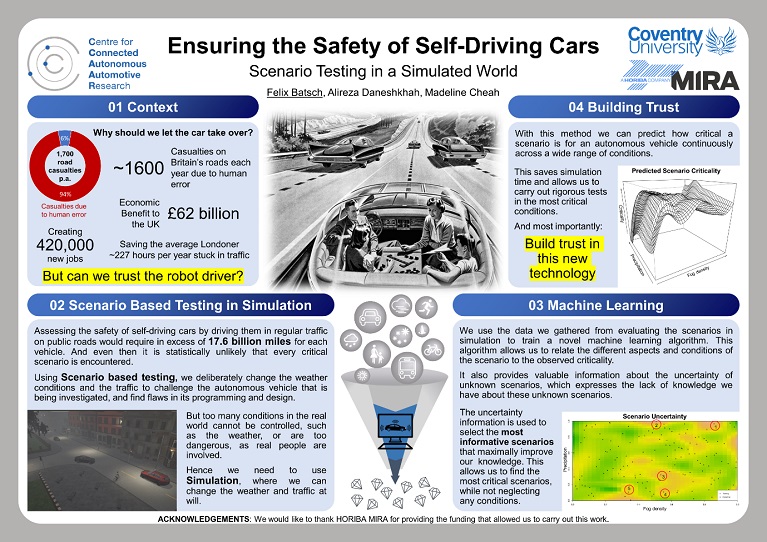By Felix Batsch, PhD Candidate in the Institute for Future Transport and Cities (IFTC).
Attending academic conferences is a breath-taking experience. It is almost inconceivable how varied the problems are that scientists from all over the world are researching and the inventiveness of their corresponding solutions. Of course, as is their intention, such conferences are mainly attended by academics and rarely, if ever, will you find a decision-maker of public life there. However, conducting ground-breaking research is all well and good, but real impact only manifests once policymakers become aware of the research and implement the solutions. Luckily there are a few events, such as the STEM for Britain Conference, which aim to bridge the gap. In the following, I will talk about my experience and the research I presented at the event.
I am a PhD student at Coventry University, where my research focuses on developing new methods for the safety assessment of self-driving vehicles. My work is set within the Centre for Connected and Autonomous Automotive Research (CCAAR), which is a longstanding collaboration between the university and HORIBA MIRA. I split my time between the two organisations and the collaborative setting gives me great insight into the real-world challenges and a practical application for my research.
In March 2021, I got the opportunity to engage with policymakers at the STEM for Britain Poster Conference, as I was one of the ten finalists selected in the engineering category. The conference is a scientific poster exhibition and competition, organised by the Parliamentary and Scientific Committee and chaired by Stephen Metcalfe MP. It gives members of both houses an insight into the research undertaken in the UK. A panel of judges, comprising of Professors from different Universities, evaluate the submitted posters and a corresponding short presentation, with the winner being awarded the Westminster Medal.

At the conference, I presented my research on how we can ensure the safety of future autonomous vehicles by utilising simulation, scenario-based testing, and machine learning. Usually, the first question most people ask about self-driving cars is: “Why should we let the car take over? I am a much better driver!” But the sad reality is: drivers cause approximately 1700 deaths across the UK per year. 94% of these casualties are our fault, and not due to technical failures. Self-driving vehicles promise to take us, humans, and our faults, out of the equation and along the way create 420,000 jobs and add £62 billion to the UK economy by 2030. But a remaining question for the automotive industry is: Do self-driving cars keep this promise, can we trust the robot driver?
Existing research has estimated that testing the safety of a self-driving car, by driving it in regular, day-to-day traffic would require a driven distance of 17.6 billion miles. At an average speed of 50 mph that would take more than 40,000 years to complete! The solution to this problem is a method called scenario-based testing, where we leave out the uninteresting, uncritical miles and deliberately change factors that make it hard for the self-driving car to succeed. For instance, we might change the weather the car is operating in, so that it’s snowing, and add children, who chase after balls from behind parked cars. The only way we can safely and realistically do this is by running such scenarios in simulation.
After we have evaluated many different scenarios, we use this data to train a novel machine-learning algorithm that can predict which scenarios are critical. It also tells us which scenarios it cannot predict very well yet, by giving a measure of the uncertainty. From this uncertainty measure, we can pick the most informative scenarios, which we can further investigate and improve our knowledge of where the self-driving car fails, without neglecting any possible conditions.
The information can then be used to inform subsequent tests on the proving ground at HORIBA MIRA or on public roads, all the while pursuing the ultimate goal of building trust in this new technology.
A further question posed by the panel was in regard to the sustainability of self-driving vehicles. Once people trust self-driving vehicles, you could easily imagine the number of cars on the roads growing massively, as young children and adults take separate vehicles to get to school or work, threatening higher pollution and endless traffic jams. However, with the imminent widespread adoption of electric vehicles, the local pollution from vehicular transport can be greatly reduced. Furthermore, self-driving cars would lead to an increased capacity of the road network, as they can drive closer together with less safety distance, which results in a higher throughput of the road network. Ideally, traffic jams would be a thing of the past.
The virtual conference was very well organised and the presentations adhered to a strict three-minute time limit. My participation in Coventry University’s Three Minute Thesis competition during my first year greatly helped me to prepare for this and adhere to the time limit.
Unfortunately, mainly due to the online format of the conference, interaction with the other academics and the attending Members of Parliament was not possible. This left the presentation as a meaningful, albeit one-directional, point of contact. Hopefully in the near future, we will be able to return to in-person conferences and bring the valuable research conducted all around the world to fruition.
The poster is downloadable here: https://stemforbritain.org.uk/wp-content/uploads/2021/03/FELIX_BATSCH_2021_POSTER.pdf
The posters of all the finalists can be found on the Website: https://stemforbritain.org.uk/
Batsch, F. and Daneshkhah, A. and Cheah, M (2021, March). Ensuring the Safety of Self-Driving Cars – Scenario Testing in a Simulated World. Poster presented at the 2021 STEM for Britain Poster Conference, Westminster UK.




Comments are disabled